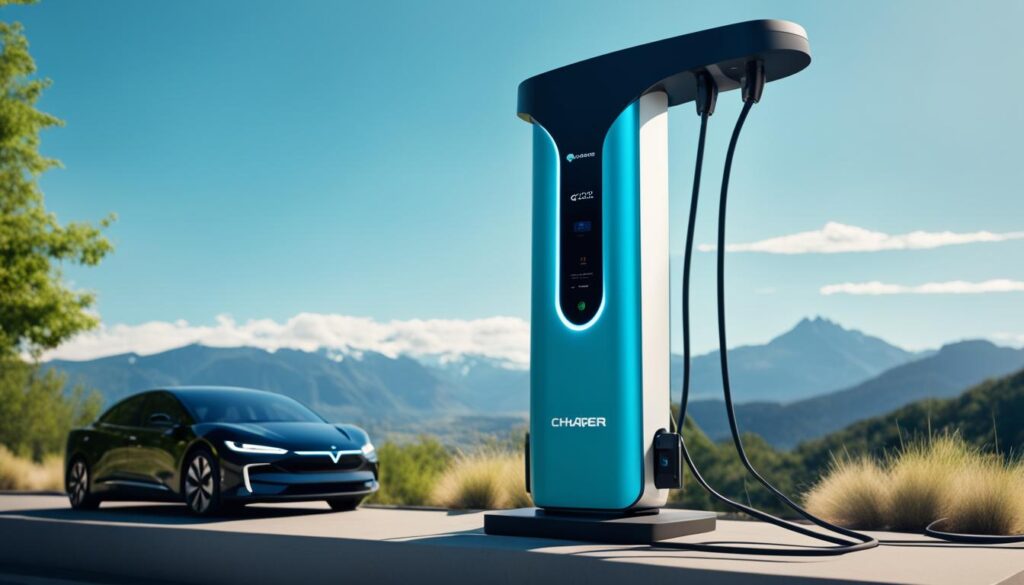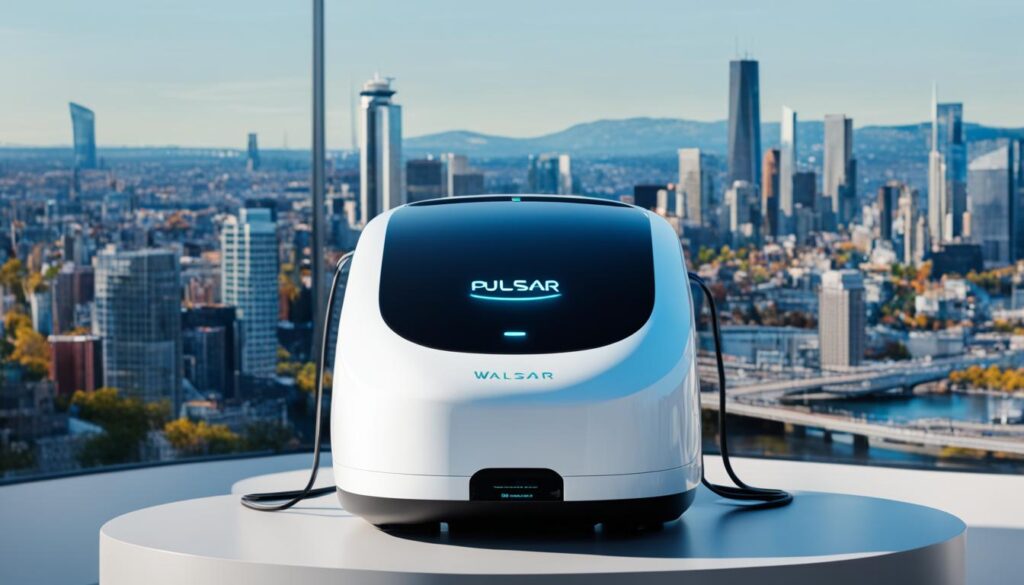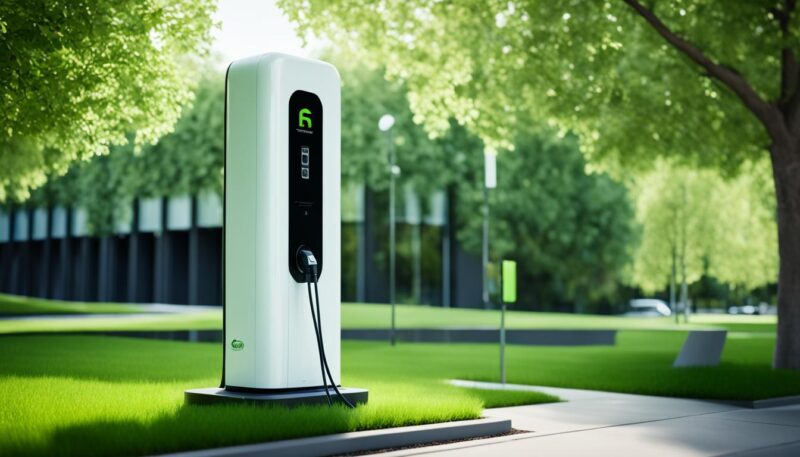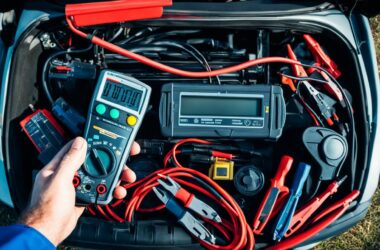As I traverse the bustling urban landscapes of the UK, I’ve noticed an increasing demand among city dwellers and those with an eye for space efficiency for the smallest EV charger options. These ultra-compact EV chargers are defying size expectations, offering robust functionality despite their diminutive statures. Whether tucked into a tight garage space or carried along for a weekend getaway, finding the best small electric car charger has become tantamount to ensuring that your electric vehicle is always ready for your next journey.
Indeed, the quest for compact charging solutions has led to innovation in the field of tiny car chargers, revolutionising the way we think about electric vehicle power management. These chargers are not just about saving space; they are about liberating EV owners from the confinement of bulky hardware and opening up new realms of possibility in terms of portability and performance.
Key Takeaways
- Smallest EV chargers are transforming the urban EV charging landscape, balancing space-saving design with high efficiency.
- Ultra-compact EV chargers embody a combination of portability and power, perfect for the modern EV owner with limited space.
- Finding the best small electric car charger means considering not only size but also charging speed and efficacy.
- Tiny car chargers offer the convenience of easy transportation and storage, making them ideal for active lifestyles and travel.
- The evolution in miniaturisation does not compromise on power, delivering an impressive charging performance in a small package.
Understanding EV Charging at Home: From 3.6kW to 22kW Power Units
As an ardent follower of the latest trends in electric vehicle technology, I’ve spotted a critical decision-making area for potential and current EV owners: selecting the right home charging unit. Let’s delve into the distinct capabilities between single and three-phase power supplies and what they mean for your home EV charging strategy.
Single Phase vs. Three-Phase Power Supply
Understanding your home’s power supply is fundamental when installing an EV charger. The majority of UK households operate on a single phase supply system, effectively restricting the charging capability of an electric car to around 7kW. Meanwhile, those with access to a three-phase supply can harness much faster charging speeds, with units up to 22kW. But don’t fret, compact electric vehicle chargers are designed to work smoothly within these typical domestic constraints.
Choosing the Right Charger: 3.6kW or 7kW?
Pondering over a 3.6kW or 7kW portable EV charger? Allow me to guide you through the specs. If your home setup and budget allow, the 7kW charger is the optimal choice. Why, you may ask? It doubles the charging pace of its 3.6kW counterpart. Let’s consider the Volkswagen ID.3: a full charge beckons in just 10 hours with a 7kW charger, a figure that doubles for the 3.6kW charger. This faster charger doesn’t only come with a small size but also with smart time-savings for the discerning EV owner.
Future-Proofing Your EV Charger Investment
My advice? Consider future-proofing your investment. Even with a mini electric car charger, selecting a higher capacity unit like the best small electric car charger on the market makes sense. It can adapt to evolving EVs with larger batteries and protracted charging needs. Trust me, you’ll thank yourself later for choosing a flexible and future-ready small size EV charging station.
The Rise of Portable EV Chargers: Compact Convenience
My fascination with innovation in the electric vehicle (EV) sector led me to the burgeoning market of portable EV chargers. With an increasing number of EV owners seeking versatility and simplicity, portable EV chargers are becoming more than just an alternative to fixed stations – they’re a preferred choice for many. The allure of these devices lies in their ability to provide an efficient charging solution while offering the freedom to charge at various locations without permanence.
These compact units, often referred to as tiny car chargers, have rapidly become popular due to their minimal footprint and ease of use. Developed for the conscientious driver who values both functionality and aesthetics, these chargers need not hide in the garage corner; with their innovative design, they serve dual purposes – utility and portability.
- Allows for charging in multiple locations
- Easily stored and transported
- Operationally intuitive
- Check the charger’s compatibility with your EV model.
- Assess the required charging power for your typical daily use.
- Consider the battery size of your EV for optimal charging times.
As an advocate for sustainable living, the shift towards portable EV chargers aligns with a greener, more adaptable lifestyle, streamlining the integration of EVs into our daily routines.
Ultimately, the tiny car charger phenomenon is reshaping how we think about EV accessibility. No longer is charging tethered to a single location – it has become a flexible facet of modern mobility.
Customer Satisfaction and the Journey to Reliable Home Charging
My recent research into the experiences of 4,130 EV owners underlines the pivotal role that customer satisfaction plays in the EV home charging realm. I found that an overwhelming majority of users—75%, to be exact—base their satisfaction on the dependability and efficiency of their charging setups. They value the smallest EV charger options not just for their space-saving advantages but for their reliability, underscoring the need for the best small electric car charger solutions to perform consistently.
The cost factors cannot be overlooked either. My survey results showcase that the affordability of installation, a vital consideration during this era of cost-of-living increases, accounts for the remaining quarter of user satisfaction. I’ve gathered detailed insights into the financial outlay EV owners are willing to invest for fitting their ideal charging station at home, which I’ll break down in the following table.
| Charging Station Type | Average Installation Cost | User Satisfaction Rating | Charge Time (hrs for full charge) |
|---|---|---|---|
| Standard 3.6kW Charger | £500 | 3/5 | 15-20 |
| Fast 7kW Charger | £850 | 4/5 | 7-10 |
| Smallest 7kW Smart Charger | £1000 | 5/5 | 7-10 |
The table illustrates that despite the higher initial cost, the smallest 7kW smart charger domain leads the pack in terms of customer satisfaction. A pricey outlay, it presents as a worthwhile investment, marrying compactness and intelligent features, ticking the boxes for what constitutes the best small electric car charger according to the preferences of my surveyed audience.
This section’s core takeaway? The journey to reliable home charging is as much about customer satisfaction derived from a product’s quality and performance as it is about value reflected in the installation expenses. It’s this combination that steers the choices of the discerning EV owner.
Smallest EV Charger: Revolutionising Your EV Experience
As an aficionado of the latest technological advancements, I’ve witnessed a transformative trend in the electric vehicle (EV) sector. The mini electric car charger is rapidly becoming an indispensable tool for EV owners, particularly for those compelled by the need for convenience and efficiency. These chargers illustrate a remarkable leap in design poise, aligning with the pressing space constraints faced by many urban dwellers.
The Philosophy of Simplification in EV Charging
Embracing a minimalist approach, the smallest ev charger units are pioneering a new chapter in the realm of EV technology. With the aim to integrate effortlessly with forthcoming power networks, these chargers function as intelligent conduits, adapting to fluctuating energy supplies and optimising charging times. It’s a design ethos that champions simplicity, yet without forsaking the robustness required for daily use.
The virtues of these small size EV charging stations are not confined to their diminutive stature; they also possess the acumen to anticipate user needs. Forward-thinking companies are redefining what it means to be a compact electric vehicle charger, infusing these devices with the ability to conduct two-way communication with smart grids, therefore promising a greener and more efficient energy ecosystem.
Customisation and Personalisation: Beyond Just Charging
The narrative doesn’t end with mere utility. Customisation is the hallmark of the modern consumer experience. Acknowledging this, manufacturers of compact electric vehicle chargers provide a suite of aesthetic and functional customisations—from varied colour options to modular design features. This capacity for personalisation resonates well with a society that cherishes individuality.
Gone are the days when an EV charger was just a pragmatic addition to one’s home—today, it is as much a statement of personal style as it is a testament to environmental consciousness. The integration of such diversity in design choices demonstrates that practicality need not be pedestrian, and function can indeed follow form.
To conclude, the transformation in EV charging is driven by more than just the necessity to power our vehicles. It’s an expression of lifestyle, an extension of the personal milieu and a stride towards a more conscientious approach to energy consumption. Whoever said that size matters never saw the giant impact these mini marvels are making on the EV landscape.
Smarter, Not Larger: How Today’s Mini Electric Car Chargers Are Packed with Tech
As someone who closely follows the latest advancements in electric vehicle technology in the UK, I’m consistently impressed by the ingenuity packed into the latest ultra-compact EV chargers. These devices are a testament to the concept that good things come in small packages. Today’s mini electric car chargers are loaded with sophisticated features that cater to the nuanced needs of modern EV users.
Let’s delve into the extensive capabilities of these miniature powerhouses. They’re not just smaller; they’re outfitted with intelligence that belies their portable size. Remote control functionality is now standard, allowing users to manage their charging experience via intuitive smartphone apps. Custom scheduling makes it a breeze to take advantage of off-peak tariffs, reducing energy costs while giving users complete control over their charging routines. Plus, their compatibility with a wide array of vehicles means that these chargers are as versatile as they are potent.
But what really sets these chargers apart is their ability to blend seamlessly into our lifestyles. The conveniences afforded by an ultra-compact EV charger are transformational — they enable us to confidently extend the boundaries of our electric expeditions and ensure that we can power our vehicles wherever we find ourselves.
- Remote Control via Mobile Apps
- Customisable Charging Schedules
- Universal Compatibility
The table below outlines the key technical features we can find in some of the most popular chargers on the market:
| Feature | Description | User Benefit |
|---|---|---|
| Real-time Monitoring | Ability to view charging status and history. | Ensures users are kept informed of their charge levels and history. |
| Voice Control Compatibility | Integration with digital assistants like Amazon Alexa. | Boosts convenience by allowing hands-free operation. |
| Adjustable Charging Current | Customisation of charging speed to suit user needs. | Facilitates faster charging when needed and energy savings when preferred. |
| Portability | Lightweight design for easy transportation. | Makes it possible to charge on the go, reducing range anxiety. |
| OLED Display | Provides clear readouts of charging information. | Delivers an effortless interface to interact with the charger’s functions. |
| Over-the-Air Updates | Wireless updates to charger software for new features and improvements. | Keeps the charger current with the latest technology enhancements. |
With each passing day, these high-tech yet portable EV chargers are proving themselves as invaluable assets for electric vehicle drivers. Their ultra-compact design matched with their advanced tech attributes makes them the ideal choice for anyone looking to marry convenience with capability.
Portable EV Chargers: Your Companions for the Road Ahead
As a zealous advocate of electric mobility, I can testify to the transformative power of owning a portable EV charger. These devices have emerged as steadfast allies for those of us keen on driving into a greener future. With the convenience they provide, especially in moments of necessity, portable chargers are undoubtedly the best small electric car charger options for those who frequently travel or live in areas with sparse charging stations.

Consider the ease with which you can carry these chargers, akin to having a reliable travel companion that ensures your electric vehicle remains sufficiently powered. Gone are the days when we fretted over ‘range anxiety’. Whether you’re venturing on an in-country odyssey or simply travelling beyond the dependable embrace of urban charging infrastructures, these chargers serve as your vigilant sentinels against the dread of a depleted battery.
A quantifiable comparison helps illuminate why a portable EV charger should be a staple in your vehicular toolkit:
| Charging Flexibility | Travel Readiness | User Experience |
|---|---|---|
| Charge anywhere with a standard wall outlet | Compact design suitable for boot storage | Intuitive interface for efficient usage |
| Versatile for various electric car models | Quick setup for immediate charging | Robust build quality for lasting reliability |
It’s clear that having a portable EV charger can be a substantial advantage. It allows you to charge at friends’ houses, remote locations, and during unforeseen stops en route. Their design harmonises with an on-the-go lifestyle, and their quality cements them as nothing short of the best small electric car charger apparatus one could hope for.
In crafting the narrative of our electric journey, I find myself increasingly intrigued by the capability and versatility of these chargers. They do more than just supply power; they provide peace of mind. And that, for many, is the spark that ignites boundless exploration.
The Environmental Commitment Behind Compact Electric Vehicle Chargers
As a burgeoning enthusiast in the field of electric vehicles, I’m continually captivated by the meticulous integration of sustainability within the manufacturing of the smallest EV charger. These are not mere gadgets; they are testament to the eco-friendly ethos steadfastly adopted by industry pioneers in Norway and Sweden.
Sustainability in Production and Lifecycle Assessments
It’s a privilege to witness how each small size EV charging station starts its life under rigorous life cycle assessments (LCAs). Such comprehensive evaluations ensure that every stage of the charger’s journey, from inception to disposal, is designed with minimal environmental impact. This means judicious use of resources, responsible material sourcing, and waste reduction strategies.
Manufacturing Designed for Nordic Resilience
The robustness of a durable mini electric car charger is put to the test in the unforgiving climate of Scandinavia. Their engineering echos the profound respect for durability in a region celebrated for its ecological practices. By adapting to these physical demands, manufacturers not only commit to product excellence but also to a holistic form of environmental stewardship.
What truly captivates me is how sustainability is not an afterthought but a core principle that shapes the production of these cutting-edge chargers. Such eco-friendly charging solutions are crucial as we transition to a greener future, where even the smallest devices can make a substantial difference.
How Tiny Car Chargers Are Setting the Pace for Future EV Infrastructure
The automotive sector is bearing witness to an impressive transformation courtesy of tiny car chargers, positioning themselves as harbingers of a new era in EV infrastructure development. It’s fascinating how these diminutive devices are proving fundamental in the grand scheme of things, where efficient electricity distribution and the intelligent employment of extant capacities are paramount to cater to the burgeoning demands of electric vehicle users.
I’ve seen how innovative EV charging solutions are streamlining the integration of EVs into the modern lifestyle. For city dwellers like myself, the value of space can’t be overstated, and the remarkably small footprint of these chargers is nothing short of a blessing. They are a testament to the brilliance of minimalist design and its ability to dovetail perfectly with the complexities of contemporary living.
| Features | Benefits |
|---|---|
| Space-Efficient Design | Maximises limited urban space, perfect for apartment living |
| Advanced Technology Integration | Enables smart charging schedules, remote monitoring, and better energy management |
| Adaptability to Varied Power Systems | Offers compatibility across different power supplies, making it versatile |
| Portable & Easy Installation | Facilitates easy relocation and quick setup, ideal for renters or those with multiple residences |
As someone keenly observing the trends and shifts in the EV market, I can affirm that there’s more to these tiny car chargers than meets the eye. They are not mere accessories but pivotal pieces of a larger puzzles—pieces that are increasingly becoming recognised for their role in paving the way towards a more adaptable and sustainable EV infrastructure.
Future cities will not only be defined by the skyscrapers that pierce the sky or the sprawling parks but also by the seamless integration of ubiquitous vehicle charging points that blend into the urban fabric—unassuming yet essential.
This is why it’s imperative to acknowledge the role of tiny car chargers in shaping a future where mobility and convenience don’t just coexist but flourish. As we venture further into this epoch of electrification, my experiences and observations lead me to be ever more optimistic about the ingenious solutions that continue to emerge in the realm of EV charging.
Wallbox Pulsar Plus: A Case Study in Ultra-Compact EV Charger Design
As a proponent of smart electric vehicle charging solutions, I’ve been enthralled by the innovative strides in charger technology aimed at enhancing user experiences. The Wallbox Pulsar Plus exemplifies the zenith of EV charging ingenuity, harmoniously blending power, performance, and convenience in a customisable package. It stands as a testament to what ultra-compact EV chargers can achieve, offering a myriad of functionalities tailored to meet the distinct preferences of users.
Essential Features of the Wallbox Pulsar Plus
The Wallbox Pulsar Plus is discerned as a paragon of ultra-compact EV charger design. With a diminutive footprint, it confounds expectations by delivering steadfast performance and versatility. It is revered for its smart capabilities, integrating flawlessly with home automation systems and allowing users to control their charger through mobile applications or voice commands courtesy of digital assistants.
Its prowess in electrifying vehicles with haste, providing a swift charging rate that furnishes 30-35 miles of range per hour, positions it as a future-proof cornerstone in personal EV charging infrastructures. The Wallbox Pulsar Plus is robust, capable of supporting EV batteries up to 48A or 11.5kW, signifying its readiness to accommodate the burgeoning demands of tomorrow’s electric vehicles.

Customise Your EV Charging with Smart Features and Accessories
Falling in step with the surge in customisable EV chargers, the Wallbox Pulsar Plus extends its appeal beyond its foundational capabilities. It presents an array of smart features and accessories designed to enrich the EV charging experience. The provision of a robust 25-foot charging cable ensures that spatial constraints are a non-issue, offering flexibility in parking and charger placement.
Connectivity is a key facet of the Wallbox Pulsar Plus, as it seamlessly integrates with Wi-Fi and Bluetooth, enabling real-time monitoring and adjustments to charging schedules and currents. Moreover, it boasts both indoor and outdoor usability, fortified with water and dust resistance, making it an indomitable comrade against the elements.
In summary, the Wallbox Pulsar Plus is not merely an ultra-compact EV charger; it is a beacon of smart electric vehicle charging, underscoring the fusion of cutting-edge technology with user-centric design. As a customisable EV charger, it caters to the individual preferences and requirements of EV owners, thus serving as a sterling illustration of modern charger innovation.
Conclusion
In summary, as we navigate the fast-evolving landscape of electric vehicle technology in the UK, the advent of the smallest EV chargers represents a significant leap towards meeting the modern motorist’s demand for practicality and sustainability. These small size EV charging stations have demonstrated how ingenuity can lead to solutions that are both space-efficient for urban environments and brimming with high-tech features. My observations have reinforced how essential these chargers are, offering customisation and a level of convenience that traditional chargers cannot match.
Moreover, it’s heartening to see how these compact devices contribute to sustainable charging solutions – harmonising with nationwide initiatives aimed at environmental stewardship. Whether installed in our homes or accompanying us during travel, these unobtrusive chargers are instrumental in crafting a future-ready electric grid. This innovative trend is not just about saving space; it illustrates a proactive approach in anticipating and shaping the infrastructure required for a greener tomorrow.
Throughout my exploration, I’ve envisaged a seamless integration of these chargers into our daily lives, reinforcing the belief that sometimes, smaller really is better. With each minuscule charger that becomes part of a household or journey, the UK moves a step closer to achieving its ambitious renewable energy targets. To those about to embark on the EV journey, the array of petite powerhouses on offer promises a world where efficiency and eco-consciousness go hand in hand, powering us towards a cleaner, more electrified horizon.
FAQ
What are the top smallest EV chargers on the market?
What is the difference between single phase and three-phase power supply for home EV charging?
Should I install a 3.6kW or a 7kW home EV charger?
How can I future-proof my EV charger investment?
Are there any portable EV chargers that offer compact convenience?
How important is customer satisfaction in home EV charging?
How is the philosophy of simplification influencing EV charging?
Can I personalise my EV charger to suit my style?
What technological advancements are packed into today’s mini electric car chargers?
Why are portable EV chargers considered useful companions for road travel?
How are compact electric vehicle charger manufacturers committing to the environment?
Are compact EV chargers designed to endure severe weather conditions?
How do tiny car chargers contribute to the future of EV infrastructure?
What are key features of the Wallbox Pulsar Plus?
How can I customise my EV charging experience with smart features and accessories?
Source Links
- https://www.whatcar.com/news/best-home-ev-chargers/n25830
- https://easee.com/uk/
- https://wallbox.com/en_us/wallbox-pulsar-plus
- https://bestevcharger.co.uk/pod-point-solo/
- https://bestevcharger.co.uk/evse-reviews/
- https://bestevcharger.co.uk/easee-one/
- https://bestevcharger.co.uk/solar-compatible-ev-chargers/











I’ve been browsing on-line more than three hours today, but I by no means found any interesting article like yours. It is pretty worth enough for me. In my view, if all webmasters and bloggers made good content as you probably did, the internet shall be much more useful than ever before.
It’s really a great and useful piece of information. I am glad that you shared this helpful info with us. Please keep us informed like this. Thanks for sharing.
I like the valuable info you provide on your articles. I’ll bookmark your weblog and take a look at once more here regularly. I’m moderately sure I will learn many new stuff right here! Best of luck for the following!
I truly appreciate this post. I’ve been looking everywhere for this! Thank goodness I found it on Bing. You have made my day! Thank you again!
Well I sincerely enjoyed studying it. This information offered by you is very helpful for good planning.
I was wondering if you ever thought of changing the page layout of your site? Its very well written; I love what youve got to say. But maybe you could a little more in the way of content so people could connect with it better. Youve got an awful lot of text for only having 1 or 2 pictures. Maybe you could space it out better?
After menopause, the number of estrogen receptors continues to decrease; however, they never disappear completely buy priligy online safe